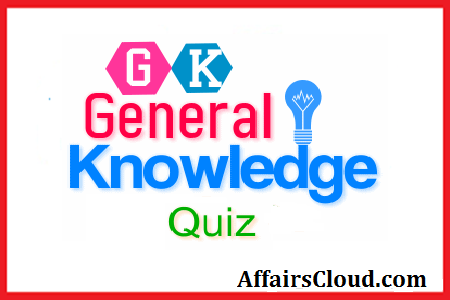Hello Aspirants.
Welcome to Online General Knowledge section in Affairs cloud, which is important for all the competitive exams. We have created Some questions related to Indian GK(Indian Polity) !!!
- Central Vigilance Commissioner hold the office for a term of
1.Four Years
2.Three Years
3.Five Years
4.Two Years
5.None of theseAnswer – 1.Four Years
Explanation :
Central Vigilance Commissioner hold the office for a term of four years or until they attain the age of 65 years, or whichever is earlier. - Double Jeopardy related to which article ?
1.Article 11
2.Article 20
3.Article 18
4.Article 32
5.None of theseAnswer – 2.Article 20
Explanation :
Double Jeopardy : A second prosecution for the same offense after acquittal or conviction or multiple punishments for same offense. - Article 19 contain how many rights originally ?
1.6
2.5
3.7
4.8
5.None of theseAnswer – 3.7
Explanation :
Originally, Article 19 contained seven rights. But the right to acquire, hold and dispose of property was deleted by the 44th constitutional amendment act of 1978. - How many states is included in Special category list ?
1.10
2.16
3.14
4.11
5.None of theseAnswer – 4.11
Explanation :
At present there are 11 States that enjoy Special Status and Special Category Status: Arunachal Pradesh, Assam, Himachal Pradesh, Jammu and Kashmir, Manipur, Meghalaya, Mizoram, Nagaland, Sikkim, Tripura and Uttarakhand - 1972 is related to
1.Wildlife Protection Act
2.Child Labour Act
3.Environment Protection Act
4.Animal Welfare Act
5.None of theseAnswer – 1.Wildlife Protection Act
Explanation :
The Wildlife Protection Act 1972 is an Act of the Parliament of India enacted for protection of plants and animal species. Before 1972, India only had five designated national parks. - The Concurrent List consists of how many item ?
1.53
2.52
3.47
4.50
5.None of theseAnswer –2.52
Explanation :
The Concurrent List or List-III (Seventh Schedule) is a list of 52 items (though the last item is numbered 47) given in the Seventh Schedule to the Constitution of India. - Separation of powers refers to the division of responsibilities between
1.Central and State
2.State and Municipalities
3.Different branches of Government
4.Supreme Court and High Court
5.None of theseAnswer – 3.Different branches of Government
Explanation :
Separation of powers refers to the division of responsibilities into distinct branches of Government to limit any one branch from exercising the core functions of another. - 8.Abolition of untouchability has been included among fundamental rights under which article ?
1.Article 15
2.Article 12
3.Article 19
4.Article 17
5.None of theseAnswer – 4. Article 17
Explanation :
Abolition of untouchability has been included among fundamental rights under article 17. - A Bill becomes law when it is passed by
1.Rajya Sabha
2.Lok Sabha
3.Both 1 and 2
4.Only by Supreme Court
5.None of theseAnswer – 3.Both 1 and 2
Explanation :
A Bill is a draft statute which becomes law after it is passed by both the Houses of Parliament and assented to by the President. - Abolition of titles is related to
1.Article 18
2.Artcile 22
3.Artcile 35
4.Artcle 42
5.None of theseAnswer – 1.Article 18
Explanation :
Article 18 of Indian Constitution related to Abolition of Titles.
Article 18(1): No title, not being a military or academic distinction, shall be conferred by the State.
Article 18(2): No citizen of India shall accept any title from any foreign State.
AffairsCloud Recommends Oliveboard Mock Test
AffairsCloud Ebook - Support Us to Grow
Govt Jobs by Category
Bank Jobs Notification



